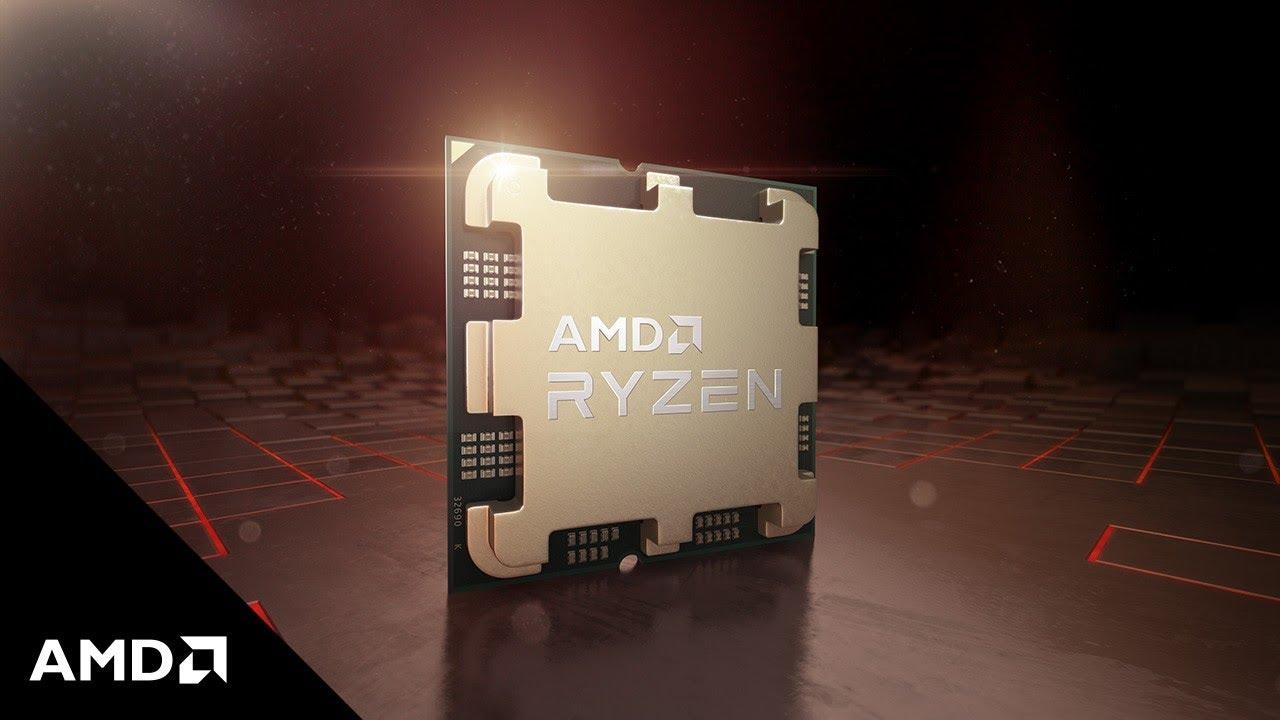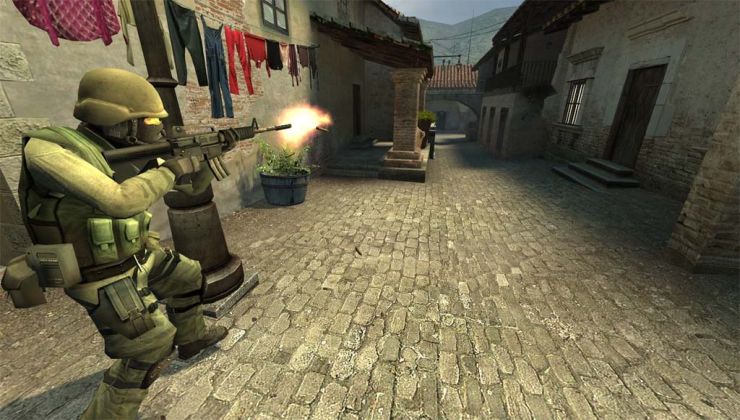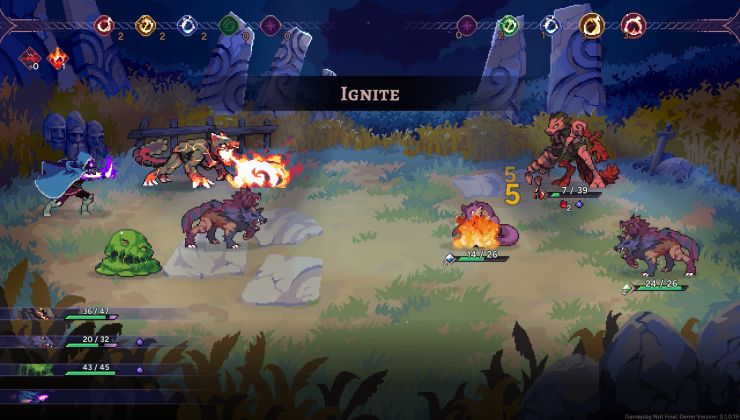AMD has revealed their next-generation Zen 4 processors with the Ryzen 7000 series that will be launching September 27.
They're saying it will give a "double-digit" IPC (instructions per cycle/clock) uplift compared to the previous generation. AMD are also claiming they will be a lot more efficient than before, leveraging the power management tech from their mobile processors.
Here's the models they've announced for now:
| Model | Cores/Threads | Boost / Base Frequency | Total Cache | PCIe | TDP | Price | |
| AMD Ryzen 9 7950X | 16C/32T | Up to 5.7 / 4.5 GHZ | 80MB | Gen 5 | 170W | $699 | |
| AMD Ryzen 9 7900X | 12C/24T | Up to 5.6 / 4.7 GHZ | 76MB | Gen 5 | 170W | $549 | |
| AMD Ryzen 7 7700X | 8C/16T | Up to 5.4 / 4.5 GHZ | 40MB | Gen 5 | 105W | $399 | |
| AMD Ryzen 5 7600X | 6C/12T | Up to 5.3 / 4.7 GHZ | 38MB | Gen 5 | 105W | $299 | |
This also comes with the new AM5 platform with dual-channel DD5 memory support, up to 24 PCIe 5.0 lanes and they say AM5 will be supported through to 2025. So you're going to be good for the next few generations of AMD processors with AM5. Installation they said will be easier than before with the 1718 pin LGA socket, it supports AM4 coolers too.
These are the chipsets that will be offered:
- AMD X670 Extreme: Bringing the most connectivity and extreme overclocking capabilities with PCIe 5.0 support for graphics and storage.
- AMD X670: Supporting enthusiast overclocking with PCIe® 5.0 support for storage and optional graphics support.
- AMD B650E: Designed for performance users with PCIe® 5.0 storage support and optional graphics support.
- AMD B650: Designed for mainstream users with support for DDR5 memory and optional PCIe® 5.0 support.
AMD X670 and X670E will be available in September but the B650E and B650 set land in October.
We also got a brief teaser of their next-generation GPUs with RDNA3 as well. During the event AMD CEO Dr. Lisa Su mentioned it uses 5nm chiplets, to provide a "more than 50%" performance per watt uplift compared to RDNA2.
You can watch the full event below:

Direct Link
So AMD is not doing big and little cores, like Intel does?Intel does big/little because they are unable to deliver cores with little power consumption. AMD with 5nm should be capable to use less power.
It's only me or the prices are high. My ryzen 1600x cost much less when I bought.
Well... I'll wait for am6 or risc-v.
Last edited by jordicoma on 30 Aug 2022 at 9:33 am UTC
So AMD is not doing big and little cores, like Intel does?
Rumors has it that they might do a big/little with a zen4/zen5 combo. But then as stated earlier, Zen are so efficient that they do not need it.
Remember that the effecient cores are just rebranded Atom-style cores. Nothing impressive and are just plain better to avoid if possible.
Min 6 cores? Isn't there an entry model or something?
6 cores is entry model… They do [6 cores](https://www.cpu-world.com/CPUs/Bulldozer/AMD-FX-Series%20FX-6100.html) and [8 cores](https://www.cpu-world.com/CPUs/Bulldozer/AMD-FX-Series%20FX-8100.html) since more than a decade (here, the linked models are from 2011).
What is more problematic is that a 6 core CPU from AMD like the FX-6100 was costing $165 at introduction with 95W TDP while now the Ryzen 5 7600X is $299 with 105W. They can definitely produce some more-entry-level CPUs (probably released later?), they just have no reason to make them having less than 6 cores.
If I'm right even the 6 core FX-6100 from 2011 was in fact produced with 8 cores with 2 being disabled… Producing a CPU with less than 6 cores in 2022 is probably requiring a specific production process that would skyrocket their price for no benefit… the less costly solution to produce CPUs with less than 6 cores in 2022 is probably to produce the cores and to disable them. Better keep them enabled if they work.
Min 6 cores? Isn't there an entry model or something?
6 cores is entry model… They do [6 cores](https://www.cpu-world.com/CPUs/Bulldozer/AMD-FX-Series%20FX-6100.html) and [8 cores](https://www.cpu-world.com/CPUs/Bulldozer/AMD-FX-Series%20FX-8100.html) since more than a decade (here, the linked models are from 2011).
What is more problematic is that a 6 core CPU from AMD like the FX-6100 was costing $165 at introduction with 95W TDP while now the Ryzen 5 7600X is $299 with 105W. They can definitely produce some more-entry-level CPUs (probably released later?), they just have no reason to make them having less than 6 cores.
If I'm right even the 6 core FX-6100 from 2011 was in fact produced with 8 cores with 2 being disabled… Producing a CPU with less than 6 cores in 2022 is probably requiring a specific production process that would skyrocket their price for no benefit… the less costly solution to produce CPUs with less than 6 cores in 2022 is probably to produce the cores and to disable them. Better keep them enabled if they work.
I can get a CPU good enough for many things for 50 Euros from Intel, 2 cores, released in 2022 ("G6900T").
I'd buy such a thing e.g. for my HTPC if the last one gives up.
Dunno why AMD shouldn't be able to make something similar.
I can get a CPU good enough for many things for 50 Euros from Intel, 2 cores, released in 2022 ("G6900T").
I'd buy such a thing e.g. for my HTPC if the last one gives up.
The Ryzen 5 7600X is the entry level model for the mainstream range of products. You don't compare the same range of products. 1. this is Ryzen, 2. this is Ryzen 5, it is expected to be good for gaming.
The G6900T is a Celeron for light clients, point of sales and tablets, on AMD side you may want to look for lower-end Ryzen 3 or Athlon. Even the Ryzen 3 range (“entry level” Ryzen range) may still be too high level for what your are looking for as they are still Ryzen CPUs (Ryzen is not the entry level family).
Dunno why AMD shouldn't be able to make something similar.
Of course they do something similar, they even have more low-level CPU families. What's right is that they are harder to find as a consumer outside of OEM, I would agree on that and maybe in the end you will buy Intel because of that, who knows…
I just picked some AMD CPUs (not all are listed there unfortunately) for a comparison:
https://www.cpubenchmark.net/compare//4605vs4924vs4927vs4389
AMD has released a 2 core Ryzen 3 5125C in May 2022 but is not listed by cpubenchmark.net yet but you may look at the 4 core 5300GE and remind it has twice the cores but is from more than one years ago so you should get something between the Athlon Gold 3150C and the Ryzen 3 5300GE, but with less energy consumption than the Celeron for sure.
Producing 2 cores Ryzen 5 doesn't make sense for AMD, that's for other ranges of products (and they exist).
Last edited by illwieckz on 30 Aug 2022 at 12:46 pm UTC
Will these ones contain the Pluton backdoor?
I can't say for sure, but I haven't seen or heard a single AMD rep state that Ryzen 7000 is infected with Pluton, be it at an event or investor meeting, so I'm hopeful.
I mean most won't get these until 2023, and maybe I'm weird, but I don't buy hardware with the intent to replace it in just a few years.
I think it's cool, but support until 2025... That seems a little short. Is it?
I mean most won't get these until 2023, and maybe I'm weird, but I don't buy hardware with the intent to replace it in just a few years.
It should mean that they will bring new processors for the platform in 2025 - not that you cannot use your old processor anymore after 2025. I cannot think of a case where I replaced a processor, but not mainboard, RAM, ...
Also, how do you apply thermal paste on that heat spreader plate? I.e. won't it go into those openings?
Last edited by Shmerl on 30 Aug 2022 at 4:57 pm UTC
I think it's cool, but support until 2025... That seems a little short. Is it?
I mean most won't get these until 2023, and maybe I'm weird, but I don't buy hardware with the intent to replace it in just a few years.
Yes I think it is short... but IMHO, I think AMD will extend it beyond 2025, but they dont want to piss off their customers if all of their boards do not support all of the latest features. (Like what happened when some of the AM4 boards did not work at m.2 4.0 speeds) No idea how much further beyond 2025 though..
But do they have Pluton?
What is Pluton?
Something you don't want on your computer, depending on where you sit regarding user freedom.But do they have Pluton?
What is Pluton?
In simple terms, it's a DRM chip inside the CPU that Microsoft & AMD designed that is similar to those found in the modern Xbox and has the potential to reign complete control over your computer and is cloud connected. For example it can submit documents to the cloud for "attestation" and "verify" that the OS isn't tampered or running pirated software. It can also receive updates from Microsoft via Windows Update and you have absolutely no control over it or say in what it may or may not do. It's great for companies like Epic and their EAC though who wish to have more control over you and your games, it's a wet dream for them.
Sadly, not all details are known about it as Microsoft are keeping their cards close to their chest regarding the full details of how it works.
The more worrying thing isn't so much the potential of "what can it do" but rather why are certain manufacturers, such as Dell & Lenovo rejecting it? They are claiming they will ship it disabled and inactive. So you have to ask yourself why would they, being companies that are fully in the pocket of Microsoft, chose to go against Microsoft like that? What do they know?
Sadly, I am biased against it as I do not support it so I am probably not the best person to explain it. I want gaming to be successful on Linux, but not at the cost of compromising my freedom to use my computer as I wish or to give up my privacy. I simply can't support such a technology.
Twice in recent memory, with current AM4... 1800/3700/5800.I think it's cool, but support until 2025... That seems a little short. Is it?
I mean most won't get these until 2023, and maybe I'm weird, but I don't buy hardware with the intent to replace it in just a few years.
It should mean that they will bring new processors for the platform in 2025 - not that you cannot use your old processor anymore after 2025. I cannot think of a case where I replaced a processor, but not mainboard, RAM, ...
Multiple times more in ancient history, which many of you may not remember, or weren't even born. I remember several generations of 3- and 486es, and a couple of Athlons, all running fine in the same main boards as their predecessors, and often more than one upgrade. I have always been assembling my machines myself, and I have always hated when I had to upgrade the main boards... and still do.
As such, I agree, "until" 2025 is rather short. If you read it critically, that covers two years. Barely enough for one end-of-life upgrade.
Last edited by Valck on 31 Aug 2022 at 2:33 am UTC











 How to set, change and reset your SteamOS / Steam Deck desktop sudo password
How to set, change and reset your SteamOS / Steam Deck desktop sudo password How to set up Decky Loader on Steam Deck / SteamOS for easy plugins
How to set up Decky Loader on Steam Deck / SteamOS for easy plugins
See more from me